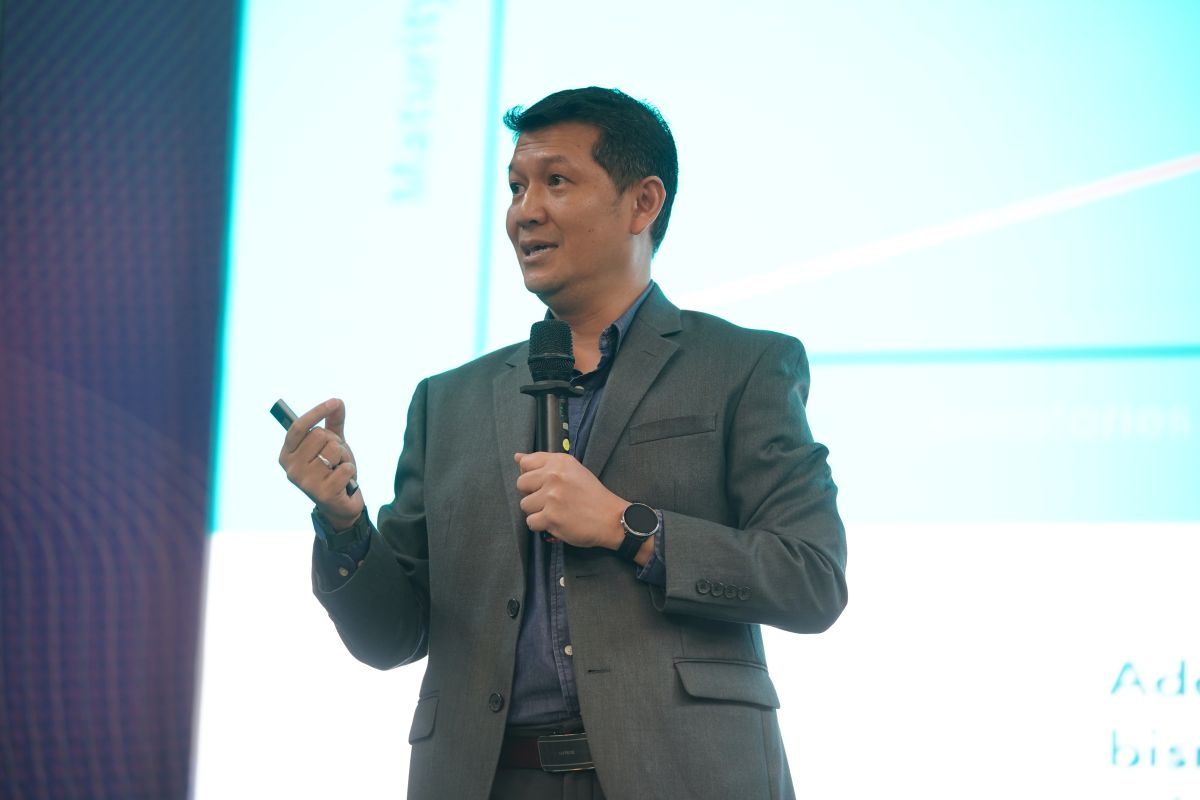Prof. Khairurrijal, a Professor Who Makes Outstanding Innovation from Simple Technology
By Fivien Nur Savitri, ST, MT
Editor Fivien Nur Savitri, ST, MT

Prof. Khairurrijal said that the award is meaningful not only for himself, but also for other professors at universities in Indonesia.
*Prof. Khairurrijal (right) receiving the Academic Leader Award 2019 in the Field of Science, in Jakarta, on Tuesday (1/10/2019)
He said, this is a proof that the government has put more attention towards professors who have strong commitment to build and manage their laboratory, leading to world recognition and deep local root in order to create excellent human resources.
“World recognition means that the research laboratories publish the result of their researches on reputable international journals and referred by world researchers. Deep local root means that a professor and his research laboratory inspire and motivate other lecturers or other research laboratories in Indonesia to make better development,” he said.
There are four aspects to assess academic leaders. They should be visionary, inspiring, encouraging, and excellent. “This means a professor should be visionary in building and managing his research laboratory,” Khairurrijal said.
Moreover, innovations that stem from the researches must receive IPR protection, both the patent, copyright, or other protections of IPR.
Creating Innovation from Paper, Pencil, and Common Computer
Khairurrijal is a professor at Physics of Electronic Materials Research Group of Faculty of Mathematics and Natural Sciences of ITB. He started building his laboratory right after finishing his study at Hiroshima University, Japan in 2001. He met several obstacles in the process, including funding. A simple way to conduct research under that circumstance was by using “paper, pencil, and common computer” method.
“I did this immediately after I got back to Indonesia. Problem with lack of tools were tackled by making the tools by our own. We make relatively cheap tools so that they are easy to reproduce and fulfill the needs of other universities. The tools also contain novelty so that they can be published on reputable international journals and/or innovation that needs IPR protection,” he said.
Together with fellow lecturers and students, in 2005 Prof. Khairurrijal create for the first time an I-V meter to make the characteristics of current vs voltage out of materials or electronic devices that he makes. Development of this tool is published on reputable international journal Measurement Science and Technology in 2007. Until today, I-V Meter has been reproduced a dozen times and are spread over universities in Indonesia. Priced up to billion rupiahs for the imported products, researchers can have similar product only for dozens of million rupiahs.
“With experience in developing the I-V Meter, we created various teaching aids. Various development of single board computers has been used for practicum of undergraduate students and the paper is published on reputable international journal named Computer Applications in Engineering Education. Various development of Physics teaching aids have also been published on Physics Education,” he continued.
Creating Nanofiber and Nanoparticle Tools
In 2007, Prof. Khairurrijal also saw an opportunity to create nanofiber and nanoparticle by using electrospinning and electrospraying techniques consecutively. This synthetic system is easier and cheaper to duplicate so that other universities can have it. “In the beginning of development, due to funding problem, we started using ‘paper, pencil, and common computer’ method,” he said.
Synthetic simulation on nanofiber have been conducted, and as time pass by, he received research grant that is not sufficient to buy synthetic system on nanofiber which is available on market. He then decided to sel- design and develop the system.
“Today, local synthetic system is reproduced and spread over universities in Sumatera, Java, and Bali. The price is cheaper than the imported version,” Prof. Khairurrijal explained.
He explained, up to this day, there are many publications on reputable international journals that use the self-made synthetic system. Dozens of innovation regarding synthetic system and synthetic result using this tool has been applied for patent. In addition, for the commercial service, a startup named Nachriebe is established under the guidance of LPIK ITB (Institute for Innovation Development and Entrepreneurship).
Promote Science in Indonesia and ITB
As a scientist, he thinks that advancement of science in Indonesia can be seen from the advancement of basic research. Attention toward basic research are still considered as low. It is moving, but slowly. Nevertheless, lately there have been accelerations due to performance target in each university.
He believes the “paper, pencil, and common computer” is efficient to tackle obstacles, but investment in standard tools that are needed for research has to be done nevertheless.
According to him, the main point to promote advancement in science is that we have to grow academic culture which involves manners, norms, values, and ways of behaving, studying, and working in a university. Then, we should grow research culture that runs in world research community. Next, there should always be new information regarding world research development in respective fields.
“We should be close to local problems that need to be tackled. Synthetic that integrate the development of world researches and our local problem is very possible to improve the world’s view on us. Moreover, research collaboration between researchers in home and abroad should be pushed,” he concluded.


.jpg)

.jpg)
.jpeg)


